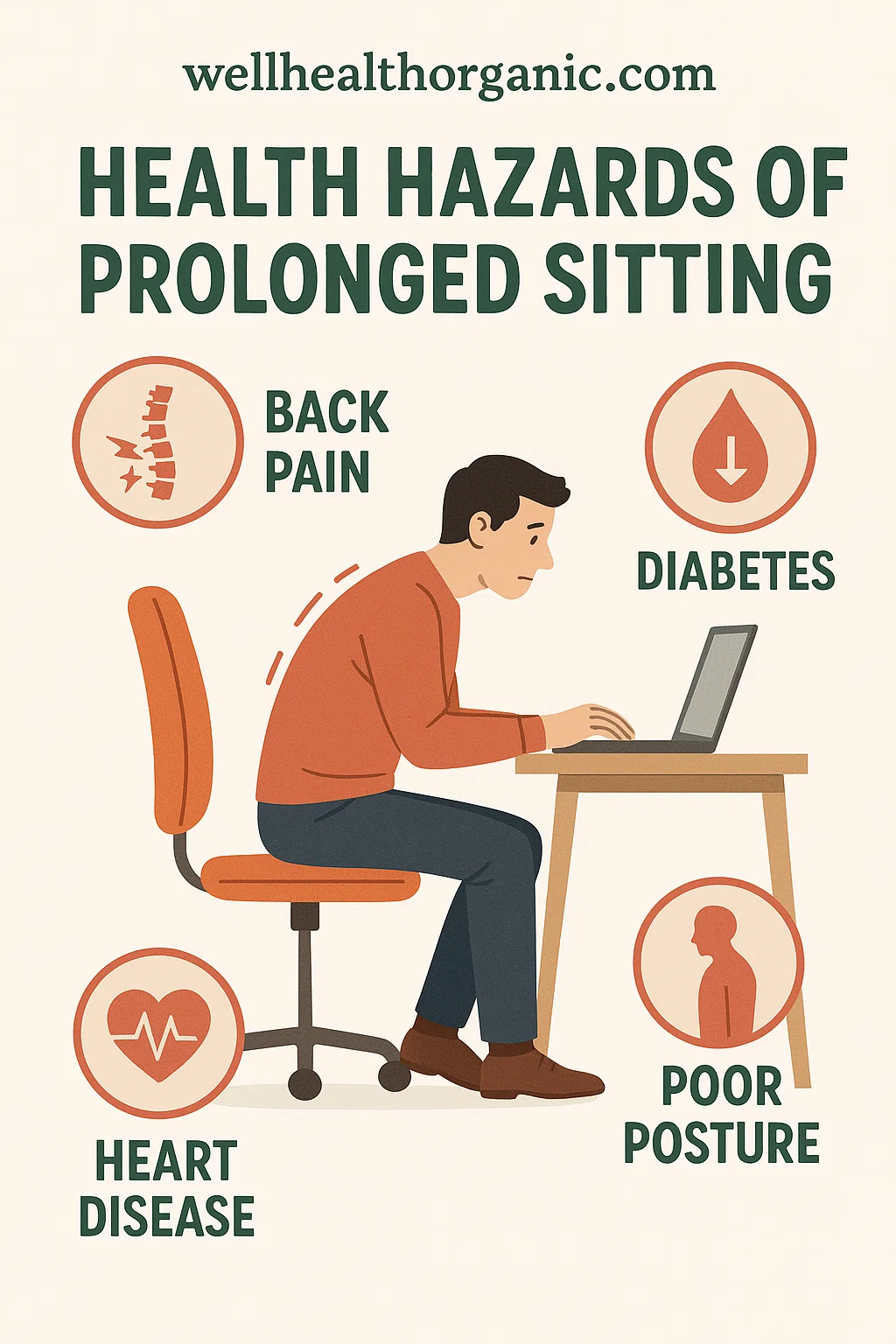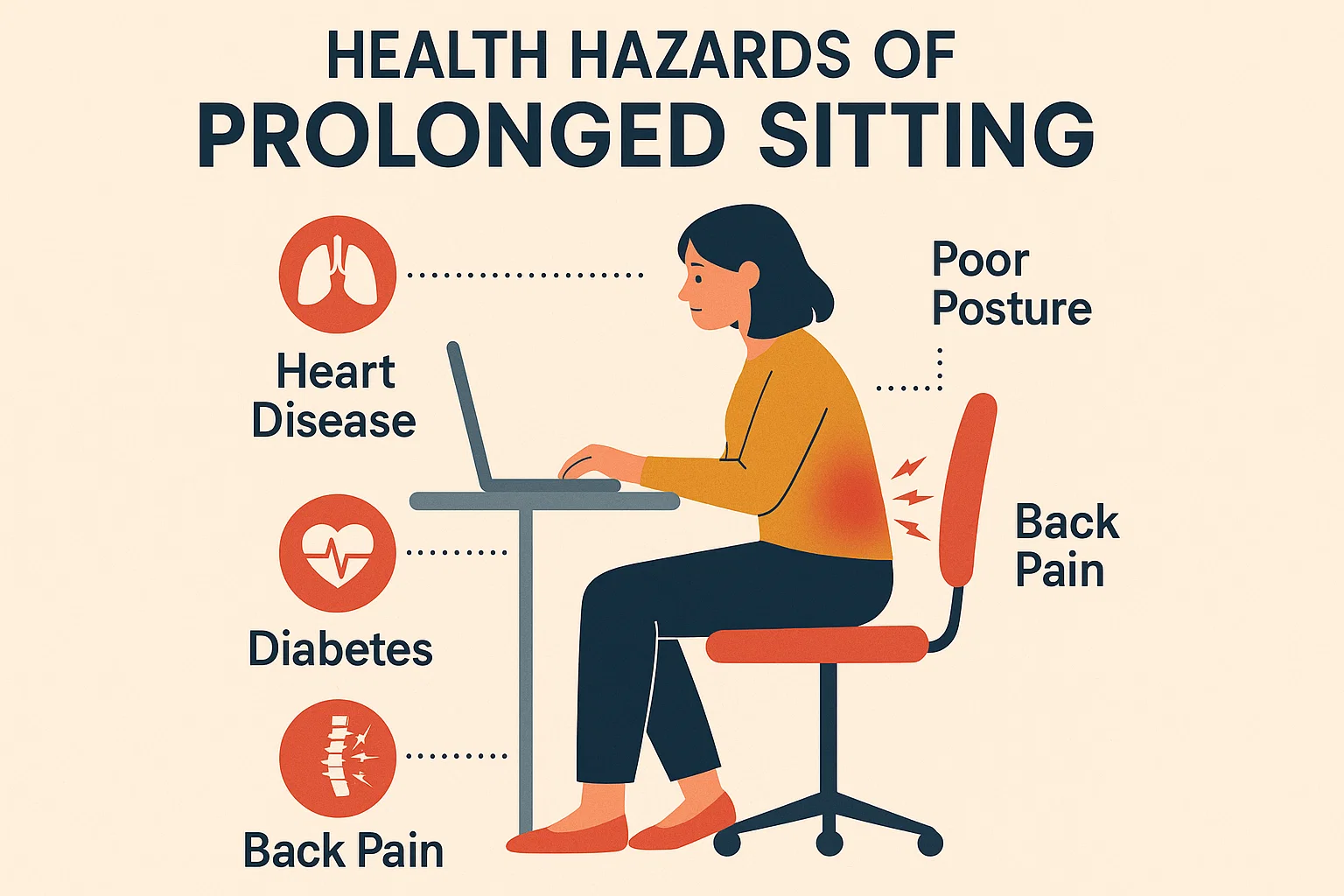In today’s fast-paced digital world, most of our daily activities revolve around screens—whether it’s work, entertainment, or social connection. With this increasing reliance on technology, one thing we often overlook is how long we sit. From office desks to couches at home, prolonged sitting has become a part of our routine. But what if this “normal” habit is silently harming us?
As highlighted on wellhealthorganic.com:health-hazards-of-prolonged-sitting, extended periods of sitting can lead to several serious health issues—many of which go unnoticed until it’s too late. This article aims to explore these health risks, their causes, and practical ways to counteract the damage caused by a sedentary lifestyle.
Understanding the Modern Sedentary Lifestyle
The average adult now sits for 8 to 12 hours a day, according to global health research. Whether it’s at work, during meals, or while relaxing, sitting consumes a major part of our lives. The problem isn’t just sitting itself, but sitting without movement for long stretches.
According to medical experts featured on wellhealthorganic.com, prolonged sitting can negatively affect our metabolism, posture, circulation, and even mental health.
Top Health Hazards of Prolonged Sitting
Let’s take a closer look at the dangers associated with excessive sitting and how they can impact overall health.
1. Increased Risk of Heart Disease
One of the most severe risks of prolonged sitting is its impact on cardiovascular health. Research suggests that sitting for long periods slows down blood circulation, which can cause fatty acids to build up in the blood vessels. This increases the risk of high blood pressure, cholesterol buildup, and heart disease.
A study published by the American Heart Association found that sedentary individuals are 125% more likely to develop cardiovascular disease compared to those who are physically active.
2. Obesity and Weight Gain
Prolonged sitting reduces calorie burning significantly. While sitting, your muscles are inactive, leading to lower energy expenditure. This makes it easy to gain weight, especially if paired with poor eating habits. Even regular exercise might not offset the negative impact of sitting all day—this is known as the “active couch potato” phenomenon.
3. Type 2 Diabetes
Extended periods of sitting are directly linked with insulin resistance, which can lead to Type 2 diabetes. Studies show that sitting for more than 6 hours a day can decrease insulin sensitivity, resulting in higher blood sugar levels—even if you’re not overweight.
According to wellhealthorganic.com, this makes desk-bound jobs especially dangerous for individuals with a family history of diabetes.
4. Poor Posture and Musculoskeletal Problems
Sitting at a desk for hours often leads to slouching, rounded shoulders, and forward head posture. Over time, this puts stress on your spine, lower back, neck, and hips, leading to chronic pain and muscular imbalances.
Back pain is one of the most common complaints among office workers. Without ergonomic furniture and regular movement, these issues can become permanent.
5. Mental Health Decline
Prolonged sitting has also been associated with anxiety and depression. Reduced physical activity limits the release of endorphins—the brain’s natural mood boosters—leading to mental sluggishness and stress. Isolation during remote work further adds to the mental toll.
6. Deep Vein Thrombosis (DVT)
When you sit for long periods, especially during travel or office work, blood tends to pool in your legs. This can lead to blood clots, known as Deep Vein Thrombosis (DVT). If these clots travel to the lungs, it can become a life-threatening condition called pulmonary embolism.
7. Risk of Premature Death
A meta-analysis involving over 1 million people found that sitting for more than 8 hours a day is associated with a 15–20% increase in the risk of early death. This risk is comparable to that of smoking and obesity.
Clearly, prolonged sitting is more dangerous than it seems.
Symptoms That Indicate You’re Sitting Too Much
According to wellhealthorganic.com:health-hazards-of-prolonged-sitting, the following symptoms may be warning signs:
- Constant back or neck pain
- Muscle stiffness and joint discomfort
- Tiredness and mental fog during the day
- Weight gain or bloating
- Swelling in legs or ankles
- Numbness in the lower body
If you’re experiencing these symptoms regularly, it’s time to reassess your sitting habits.
How to Reduce the Health Risks of Prolonged Sitting
The good news is that the harmful effects of sitting are largely preventable through small, consistent changes in daily habits.
1. Practice the 30-30 Rule
Every 30 minutes of sitting, get up and move for at least 2–5 minutes. Walk around, stretch, or just stand up and shake your legs. Use a reminder app or a timer if needed.
2. Use a Standing Desk
Standing desks or adjustable workstations help you alternate between sitting and standing. This keeps your spine engaged and encourages better posture and circulation.
3. Stretch Regularly
Incorporate stretching routines, especially for the neck, back, hamstrings, and hips. This prevents muscle stiffness and improves flexibility.
4. Stay Physically Active
Aim for at least 30 minutes of moderate activity daily, such as brisk walking, cycling, yoga, or strength training. Even short bursts of movement throughout the day make a huge difference.
5. Improve Ergonomics
Use an ergonomic chair, position your screen at eye level, and keep your feet flat on the ground. Proper posture prevents spinal strain and reduces fatigue.
6. Walk During Calls or Breaks
Use breaks as an opportunity to walk or stretch. Even walking meetings can keep you active while staying productive.
7. Monitor Your Activity
Wear a fitness tracker or smart device to keep track of steps, sitting time, and calories burned. Awareness often leads to better habits.
Final Thoughts
As highlighted in wellhealthorganic.com:health-hazards-of-prolonged-sitting, excessive sitting is one of the biggest yet most ignored threats to modern health. It silently affects our heart, metabolism, spine, and even our lifespan. Fortunately, with small lifestyle adjustments and mindful habits, you can drastically reduce these risks.
Remember: your body was made to move. While technology and convenience have made our lives easier, they’ve also made us more sedentary. The solution is simple—sit less, move more.
Start today. Stand up, stretch, and take a walk. Your body will thank you.










